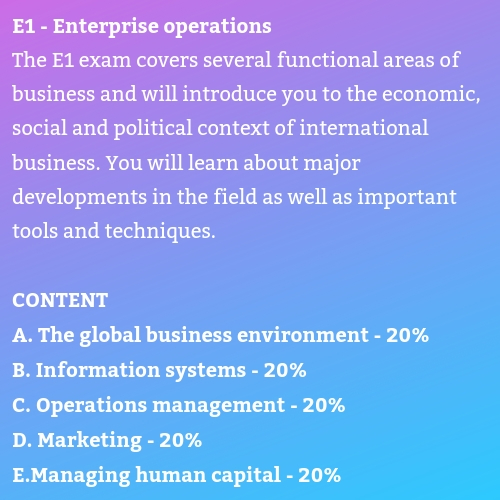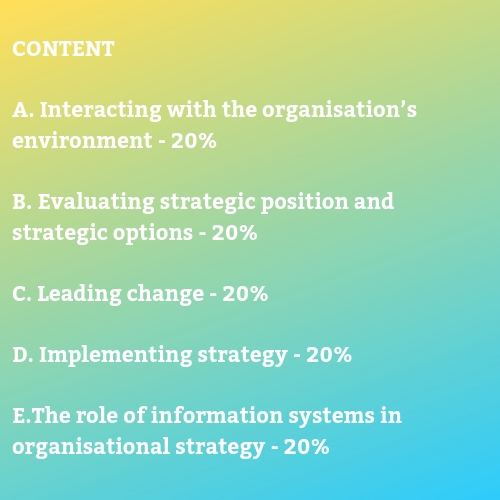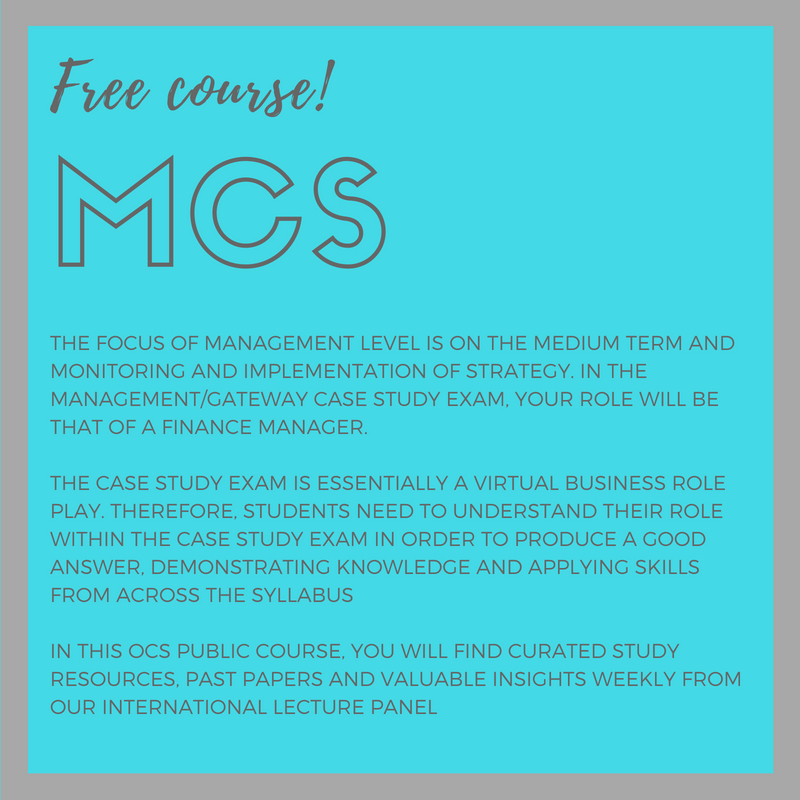Available courses
BA1 | FUNDAMENTALS OF BUSINESS ECONOMICS | ADNOC
This subject primarily covers the economic and operating context of business and how the factors of competition, the behavior of financial markets and government economic policy can in uence an organisation. It also deals with the information available to assist management in evaluating and forecasting the behaviour of consumers, markets and the economy in general.
The focus of this syllabus is to provide you with an understanding of the areas of economic activity relevant to an organisation’s decisions, and within this context, the numerical techniques to support such decisions.
The BA1 syllabus comprises the following topic areas:
A. Macroeconomic and institutional context of business (25%)
B. Microeconomic and organizational context of business (30%)
C. Informational context of business (20%) D. Financial context of business (25%)
The percentage weighting shown against each topic area is the syllabus weighting. It is important to study all areas, as all syllabus topics will be examined.
BA2 | FUNDAMENTALS OF MANAGEMENT ACCOUNTING | ADNOC
BA2 covers the fundamental knowledge and techniques that underpin management accounting, by identifying the role of a management accountant, and the role of CIMA within organisations (both private and public sector entities), and the wider role in society. Therefore, BA2 deals with the following key areas.
-
Identification and classification of costs, and their behaviour
-
Application of tools and techniques used to plan, control and make decisions
-
Budgetary control, reporting of organisational performance and calculation of variances
-
Investment appraisal, break-even analysis and pro t maximization to support short and long term decision-making
A two-hour computer based assessment, comprising 60 compulsory objective test questions will be used to assess candidates of BA2. Short scenarios may be given to which one or more objective questions relate.
Refer page 19 of the 2017 Syllabus for the details in BA2.
This Transition Guide aims to answer questions such as:
-
What in the BA2 syllabus mirrors that of C01?
-
What are the new topics in BA2?
-
What topics remain the same (as in C01), but need a different approach in teaching (and learning)?
-
What topics in C01 are no longer in the BA2 syllabus?
BA3 | FINANCIAL ACCOUNTING | ADNOC
SYLLABUS OVERVIEW
The main objective of this subject is to obtain a practical understanding of nancial accounting and the process behind the preparation of nancial statements for single entities.
These statements are prepared within a conceptual and regulatory framework requiring an understanding of the role of legislation and of accounting standards. The need to understand and apply necessary controls for accounting systems, and the nature of errors is also covered. There is an introduction to measuring nancial performance with the calculation of basic ratios.
Note: Students are required to be aware of the format
and content of published accounts but are not required to prepare them. No detailed knowledge of any specific
accounting treatment contained in the International
Financial Reporting Standards (IFRSs) – including the
International Accounting Standards (IASs), – is necessary,
except in terms IAS 2 and the treatment of inventory, IAS 16
and IAS 38 for basic non-current asset transactions.
IAS 1 and IAS 7 formats will form the basis of the nancial statements. The terminology used for all entities will be that of International Financial Reporting Standards. This will enable students to use a consistent set of accounting terms throughout their studies.
BA4 | FUNDAMENTALS OF ETHICS, CORPORATE GOVERNANCE & BUSINESS LAW | ADNOC
SYLLABUS OVERVIEW
The learning outcomes in this subject re ect the professional standards to be demonstrated for the bene t of all stakeholders. With this in mind, the place of ethics and ethical con ict is an essential underpinning for commercial activity. Ethics is more than just knowing the rules around con dentiality, integrity and objectivity. It’s about identifying ethical dilemmas, understanding the implications and behaving appropriately. It includes the role of corporate governance, corporate social responsibility and audit; and their increasing impact in the management of organisations.
Wherever business is conducted the legal and administrative framework underpins commercial activity. With this in mind the areas of contract law, employment law, administration and management of companies is considered.
ASSESSMENT STRATEGY
There will be a two hour computer based assessment, comprising 85 compulsory objective test questions.
C - SUITE NOV 2017
The CIMA CFO Programme is an exclusive programme offered to Chief Financial Of cers (CFOs), Chief Executive Of cers (CEOs) and senior management who wish to enhance their professional standing through CIMA.
As part of this fast track programme, successful candidates will attend four mandatory revision workshops and sit only the last paper of the CIMA Professional Qualification. With successful completion of this paper and the relevant work experience, the candidates will qualify for CIMA membership and earn the professional global designation of Chartered Global Management Accountant (CGMA) conferred by CIMA and the American Institute of Certified Public Accountants.
CIMA C01 Revision Videos
CIMA C01 Revision Videos
E1
E1 enterprise operations
The E1 exam covers several functional areas of business and will introduce you to the economic, social and political context of international business.
You will learn about major developments in the field as well as important tools and techniques.
E2
Enterprise management
The emphasis of the E2 enterprise management exam is on a holistic, integrated view of management across organisation.
It builds on important concepts in strategic management and develops tools and techniques for identifying the key types of competitive environment.
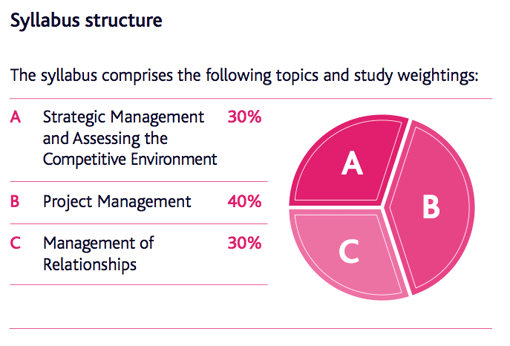
E3
Enterprise strategy
Exam E3 focuses on developing the knowledge and skills used in designing and implementing
strategy.
Strategy is content based. You will learn how the organisation’s stakeholders and external environment affect strategy development. And how context and the internal capabilities of the organisation can shape the generation and evaluation of strategic options.
You will also learn how to apply tools to help you evaluate the performance implications of a given strategy.
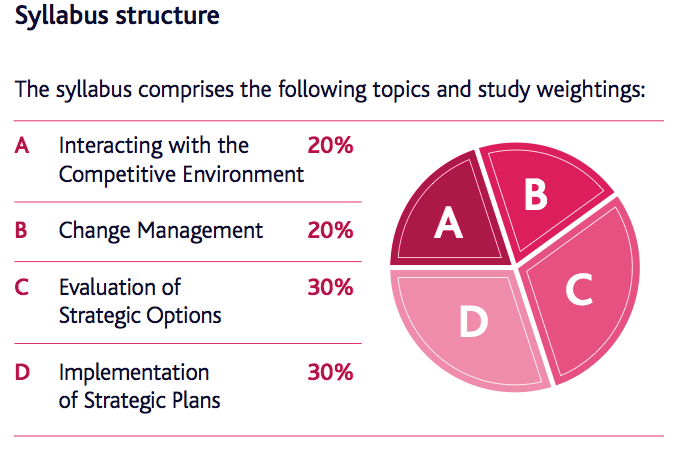
F1
Financial operations
The F1 exam focuses on how to prepare full financial statements for a single company and the principal consolidated financial statements for a simple group.
You will also learn about the regulatory and ethical context of financial reporting. This is vital in ensuring financial statements meet users’ needs.
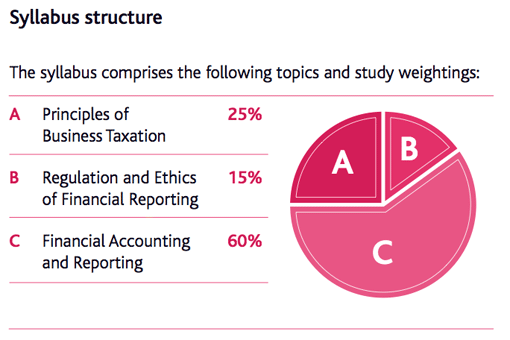
F2
Financial management
F2 extends the scope of the F1 Financial Management exam.
It looks at advanced topics in financial accounting - the preparation of full consolidated financial statements
and complex issues of principle in accounting standards.
It also deals with developments in external reporting.
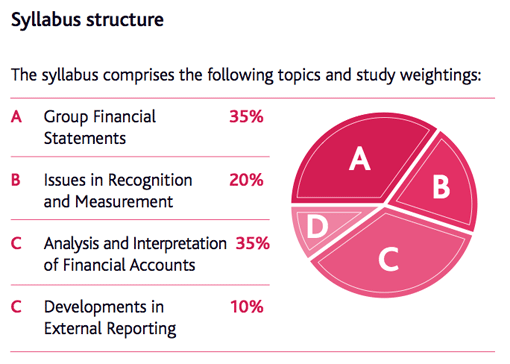
F3 Revision Videos
F3 financial strategy
The F3 exam focuses on the key elements in designing and managing the organisation’s financial strategy within a general regulatory and investment environment.
It also looks at a broad range of investment decision and takes account of broader strategic issues as well as financial analysis.
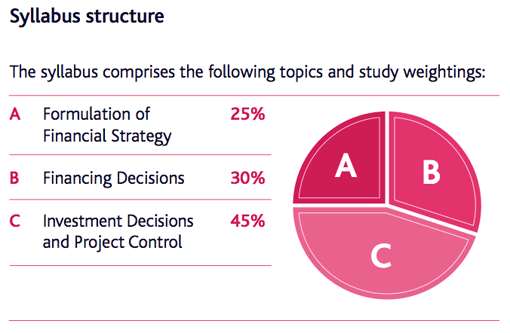
F3 SCS Financial Strategy Revision
| Weight | Syllabus topic |
| 25% | A. Formulation of financial strategy |
| 35% | B. Financing and dividend decisions |
| 40% | C. Corporate finance |




